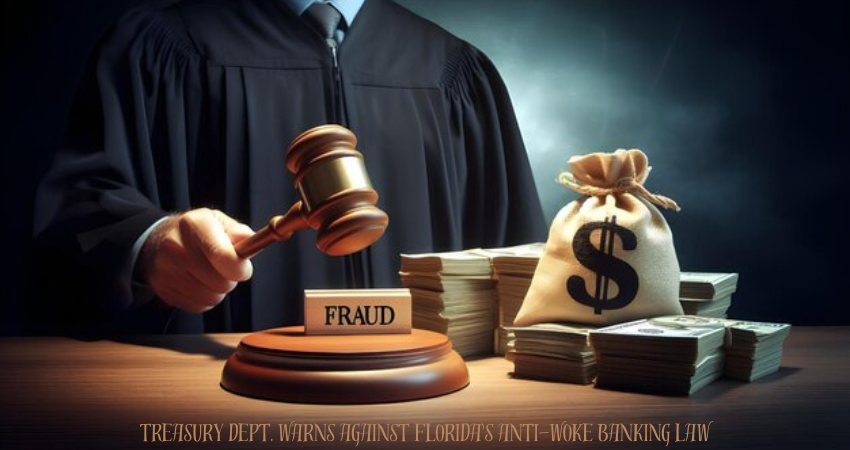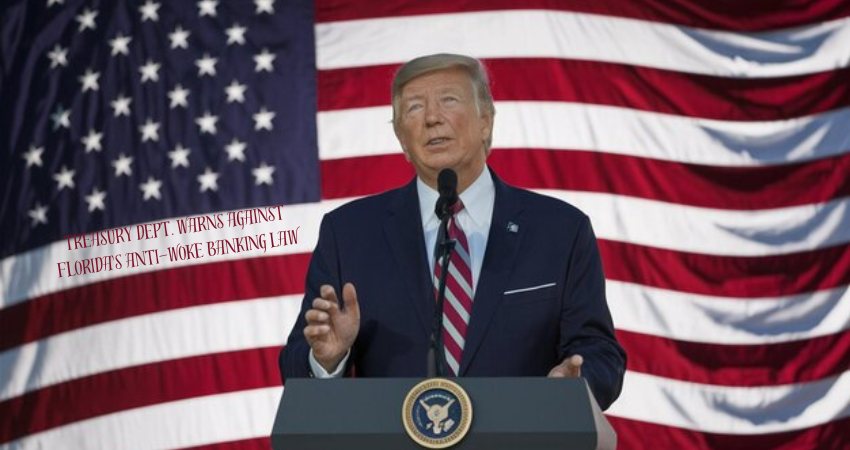Beneath the gilded arches of finance, where numbers turn like wheels of fate, a battle brews—not of coin or trade, but of ideology. The Treasury Department stands as a sentinel, sending out a foreboding warning against treasury dept. warns against florida’s anti-woke banking law . What is this law, and why does it matter? Beyond the cold, sterile text of legislation, this is a narrative about principles clashing, with consequences rippling far beyond the borders of a single state.
Understanding Florida’s Anti-Woke Banking Law
The Birth of Controversy
Florida’s anti-woke banking law was conceived in the fires of modern political discourse, where the notion of “wokeness” has become both a banner and a bullseye. But here, within the financial sector, this law seeks to curb what it perceives as the encroachment of progressive ideals into the machinery of money. It’s a bold strike against financial institutions that weigh social justice, environmental responsibility, and ethical governance when making business decisions.
The Essence of the Law
The law aims to prevent banks from considering Environmental, Social, and Governance (ESG) factors when issuing loans or making investment decisions. It frames itself as a defender of neutrality, pushing back against what some see as the overreach of “woke” values into finance.
But neutrality, in this sense, becomes a stormy sea. For those who embrace ESG, this legislation threatens to turn back the clock on progress, unraveling the delicate threads of responsible investment and social stewardship.
The Treasury’s Voice: A Warning in the Winds
The Federal Treasury’s Concern
When the U.S. Treasury Department speaks, it often does so with a tone of calculated calm. Yet, in response to Florida’s law, there is an unmistakable tremor in its voice. The warning is clear: this legislation could disrupt the financial sector, endangering stability, equity, and even the economy’s broader resilience.
Impact on Financial Institutions
For banks, the warning from the Treasury feels like a bell tolling in the dead of night. The fear is that this law could force financial institutions into a bind—between abiding by state law or adhering to the broader federal and international norms that increasingly prioritize ESG. This tension could cause a fracture in the financial world, with banks struggling to navigate between conflicting ideologies and regulations.
Strangling Innovation
Moreover, the Treasury’s warning hints at a deeper fear—that laws like Florida’s could stifle financial innovation. As the world turns towards sustainable investing, driven by both market demand and moral imperatives, legislation that punishes or restricts ESG considerations may push banks back into old, outdated models of risk assessment.
Ideological Divide: Florida vs. the Treasury
A Clash of Values
The heart of the issue is ideological. Florida’s lawmakers argue that their anti-woke banking law is about preserving neutrality and ensuring that financial decisions are made based on economics, not social causes. But to the Treasury, this law represents a retreat—a denial of the evolving role of finance in addressing the world’s greatest challenges.
It is a collision of visions: one that sees progress in social responsibility, and another that yearns for a past where money and morals were kept strictly separate.

The Political Backdrop
Behind every law is a backdrop of politics, and here, the colors are vivid. Florida’s leadership has embraced a staunchly conservative stance, positioning itself as a bastion against progressive ideals. The anti-woke banking law is part of this broader effort—a symbolic and practical gesture aimed at pushing back against what they see as the overreach of liberalism.
Yet, this pushback finds itself against a federal tide, with the Treasury—and much of the financial world—flowing in the opposite direction, towards greater inclusion, responsibility, and sustainability.
The Ripple Effect on the Economy
Markets on Edge
The Treasury warns that Florida’s law could have unintended consequences for the economy. Markets, ever sensitive to disruption, may react to the uncertainty this law introduces. Investors, wary of the instability it could create, may start to pull back from Florida, causing economic ripples that stretch far beyond the state’s borders.
Bankers in a Bind
For bankers, the law presents a dilemma. Should they follow state law and ignore ESG factors, or heed the federal government’s warning and risk violating state legislation? This tug-of-war leaves financial institutions in a precarious position, one where they are forced to navigate treacherous legal and ethical waters.
Risk to National Stability
At a national level, the treasury dept. warns against florida’s anti-woke banking law could undermine the broader financial system’s stability. By restricting the ability of banks to make socially responsible choices, the law could increase systemic risk, making the economy more vulnerable to future crises.
The Human Element: Who Stands to Lose?
The Communities at Stake
Behind every financial decision are people—families, workers, communities. The Treasury’s concerns go beyond abstract economics. They are a plea for the protection of those who stand to lose the most if ESG considerations are discarded: marginalized communities, those affected by climate change, and workers in industries struggling to adapt to the future.
Repercussions for the Common Citizen
For the average Floridian, this law may seem distant, buried in the technicalities of banking. But its effects could trickle down, impacting everything from the availability of loans to job creation and economic growth. The Treasury’s warning isn’t just about numbers; it’s about lives.
Conclusion: A Battle Far From Over
The clash between Florida’s anti-woke banking law and the U.S. Treasury’s warning is not merely a legal or financial debate. It is a reflection of deeper tensions in American society—tensions between progress and tradition, responsibility and profit, inclusivity and neutrality. As this story unfolds, it reminds us that even in the world of finance, ideology is never far behind.
FAQs
What is Florida’s anti-woke banking law?
It is legislation that seeks to prevent banks from considering Environmental, Social, and Governance (ESG) factors when making financial decisions.
Why is the U.S. Treasury concerned about this law?
The Treasury warns that the law could disrupt financial stability, create legal conflicts for banks, and hinder innovation in sustainable investing.
How could this law affect the economy?
The law may cause market instability, discourage investment in Florida, and increase systemic risks in the financial sector.
What are ESG factors?
ESG stands for Environmental, Social, and Governance—criteria used by financial institutions to assess the ethical impact and sustainability of investments.
Who could be most affected by this law?
Marginalized communities, those impacted by climate change, and workers in industries transitioning towards sustainability are likely to be the most affected.
